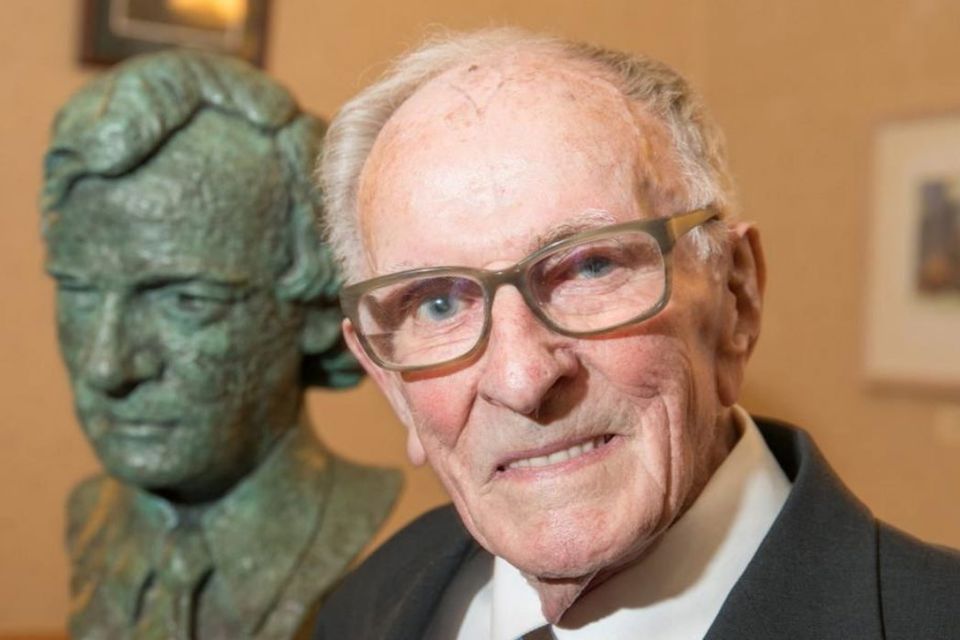President, Taoiseach lead tributes to renowned historian, Professor John A. Murphy
Macroom born and bred writer was fearless commentator
The death has been announced of Professor John A. Murphy. He is pictured here with a bust carved from a portrait by Seamus Murphy which was unveiled in the Aula Max in UCC on the occasion of his 90th birthday in 2017.
Tributes have been paid to the historian, author, columnist and Freeman of Macroom, John A. Murphy whose death at the age of 95 was announced on Monday.
Leading the tributes was President of Ireland, Michael D. Higgins, who served as a Senator alongside the UCC Professor on the NUI panel in Seanad Éireann, who described Professor Murphy as a ‘dear friend’ in his statement.
"John was one of our most gifted historians who made a profound and distinctive contribution to the public awareness of the political, historical and cultural dimensions of our society.”
President Higgins described Professor Murphy as someone who made a ‘unique contribution in his pioneering and bilingual work in bringing history to a new audience through the medium of television’.
"He did so with courage and humour,” said President Higgins.
Taoiseach Mícheál Martin said he was ‘very sad’ at the passing of Professor John. A, Murphy whom he recalled as one of his ‘first lecturers in Irish modern history’ while studying in UCC.
“His thought-provoking & courageous views personified the best of academic life.
“He was a strong voice in the Seanad and passionate believer in peace & reconciliation on our island.”
Professor Murphy taught in UCC from 1960 until 1990, and was appointed the Professor of History in 1971.
n
Indicative of his status in the University, he was awarded an honorary doctorate in 2001, and a bronze bust of Prof. Murphy by sculptor Seamus Murphy RHA was unveiled at a special event held in 2017 in the Aula Maxima to mark his 90th birthday.
UCC President, Professor John O’Halloran said the enteire UCC community was deeply saddened to learn of John A’s passing.
“A giant of our institution, his own story is deeply intertwined with the history of UCC, a heritage he arduously worked at preserving.
“Upon meeting Queen Elizabeth II, he recalled ‘that history is a record of the past, not a chronicle of grievances’ and this principle guided his work and his teaching to generations of our History students.
“His contribution to our University is without equal,” said Professor O’Halloran said as he conveyed the deepest condolences to Professor Murphy’s family.
Composer Peadar Ó Riada recalled John A. Murphy fondly as a friend of his father, Seán Ó Riada, when they were both lecturers in UCC during the 1960s.
“I recall John A. Murphy and my father as well as Seán Lucey, Terry Folly, the professor of Spanish, and John Montague being very friendly in those times. They were very ‘Gaelach’."
Describing Professor Murphy as a ‘cara fán mo shaoil/lifeldeong friend’ who has departed, he said he was delighted that Professor Murphy was rejoined with his wife, Cita, who had predeceased him in 2020.
“He added immensely to the richness of my life, siúcra agus salann, both sweet and bitter.”
A native of Sleaveen East in Macroom, Professor Murphy arrived in UCC in 1945 to study history and Latin as a scholarship student.
During his public life he was a prolific author and a fearless commentator and while he maintained he was a proud Irish republican all his life, his columns in the Sunday Independent were viewed as strongly critical of Sinn Féin and the Provisional IRA.
In 2006 he became just the second person from Macroom to be awarded the freedom of the town. The first was entrepeneur and businessman Dermot Desmond and subsequently the honour has been bestowed on Jimmy McCarthy, the songwriter.
“He was a proud Macrompian,” said Cllr Martin Coughlan, who was among the councillors who voted unaminously to confer the signal honour on the historian.
Recalling that night in December 2006, when he presented the award to Professor John A. Murphy, Connie Foley, the then chairman of Macroom Town Council, described the historian as ‘a fierce loss to Irish society in general, a real character, he was friendlhy with my father and grandfather.
“If John A started talking you could sit and listen to him for a week.”
At that event, he concluded his remarks by John A. himself: “Impugn my scholarship if you will, challenge my political motivations, spread scandal about my private life, even pollute my pint but, at your greatest peril, accuse me of going flat. “I never heard John A. utter a flat note,” said Mr Foley.

